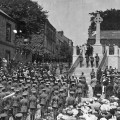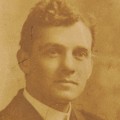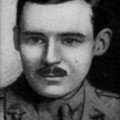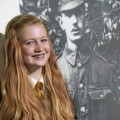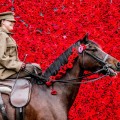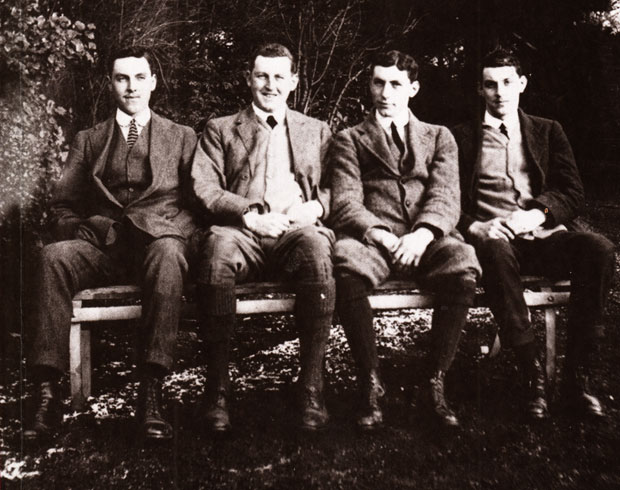
FAMILY BUSINESS: The Bradford brothers, Roland, Thomas, George and James at Milbanke
in Milbank Road, Darlington, in 1914
WE are unlikely to ever see again the dedication to duty and bravery of the North-East brothers nicknamed The Fighting Bradfords, says playwright Carina Rodney about putting the story of the four First World War heroes on stage.
The production about the medal-winning County Durham lads – three of whom paid the ultimate price – plays Durham Gala Theatre next month and Rodney says: “At that time sacrifice and duty were important messages in the community and I don’t think those values apply so much to us now. I can’t see the possibility of this happening again today.”
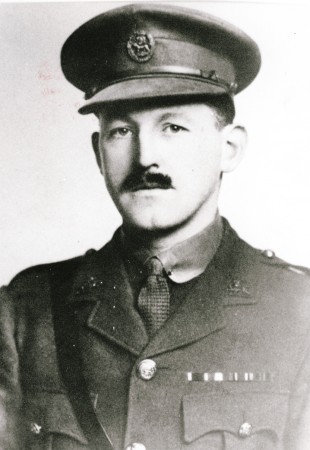
ELDEST: Thomas Bradford
Col Sir Thomas Andrew Bradford, Distinguished Service Order; Lieut Cdr George Nicholson Bradford, Victoria Cross; 2nd Lieut James Barker Bradford, Military Cross and Brigadier-Gen Roland Boys Bradford, Victoria Cross and Military Cross make up a remarkable role of honour for a family which began life at Witton Park and later moved to Darlington. Fitting the remarkable stories of the quartet into a two-hour play was never going to be easy.
“I knew it was going to quite a challenging job and the biggest was to find a story that was truthful and not just a documentary piece. When I got into the archives and started reading around the lives of the brothers it generated so many ideas because you could really hear their voices in letters from them and from soldiers who had served with them, especially Roland. Some of the letters dated from the 1960s and 1970s and you could see the vibrant hero-worship, respect and affection that soldiers had for Roland, who was quite eccentric and different. He was so different to other officers and that really came across.
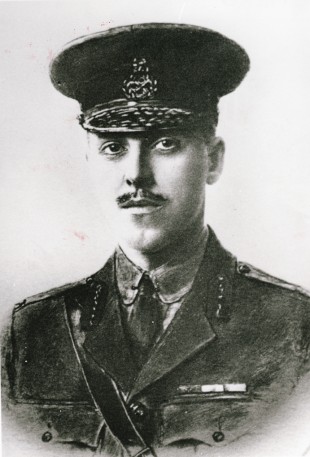
BORN LEADER: Roland
Bradford
“Roland’s identity tag was found in a junk shop by, I think, a relative of someone who served with Roland. So, I’ve created a character who meets Thomas, the one surviving brother, in the 1960s and the story is told through this finding of the tag.
“Obviously they were heroic, but the more I understood about them as people I then began to realise how they could do the astonishing things that they did. They were really strong individuals and I wanted to find something that could connect with an audience as well.”
Roland stands out of the four because he rose to brigadier-general at 25 and was so concerned about the plight of his men that he started a battalion band with instruments sent out from County Durham, formed a football league and a Shakespeare Reading Society. “I put the society into the play because Roland was amazing and very artistic which was down to his mother, who was from Kent, mixed with the sporting interest of this older and sterner father.
Roland also started a Pierrot troupe, which I’ve also featured. The things he brought to the battlefield were reminders of the life beyond and what makes us human and what is worth fighting for. I wanted to incorporate as much of that as possible. Some of his amazing speeches reminded the troops of the value of the things they were fighting for. It wasn’t just land, it was culture and the ideas that bring us together.”
Rodney found that Roland didn’t do that well at school and “kind of floated around” until war came. “One of the soldiers said of Roland, ‘If you served with him you stood a good chance of getting home’. Roland was constantly writing letters demanding better rations and newspapers and I could have written ten plays about Roland really.”
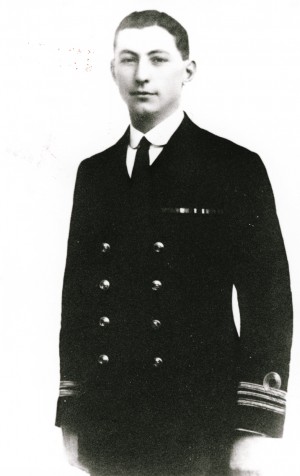
COURAGEOUS STREAK: Lieutenant Commander George ‘GN’ Bradford
She feels particularly sad about George who could have had a quiet war at sea but volunteered for a suicidal mission against Zeebrugge harbour on April 23, 1918, and led an attack on German defences which earned him a posthumous VC.
“In fact, all the brothers survived an incredibly long time and it was difficult not to let the play become a narrative. I opted for five actors, four male and one female, and they play all the different roles because this is a real ensemble piece. I wanted the audience to meet them as teenagers before they went to war and see the dynamic between the brothers and their competitiveness. Although they came from a close community they were kind of separate because they lived in a bigger house and were moved around different grammar schools if their dad thought they were having too soft a time. They didn’t have a lot of interaction with the lads down the mines that their dad managed.”
Rodney found plenty of humour involving the brothers in their letters, particularly when they were baiting and teasing each other. “I think the war probably created the best version of these men. For example, Roland had to be ordered to go and get his Victoria Cross because he didn’t want to leave his men. James was an interesting character because he was incredible brave, but he was wounded and spent some time at home and got married to a local girl (Annie “Nancy” Wall). He went back, which must have been incredibly difficult, and was killed in 1917.
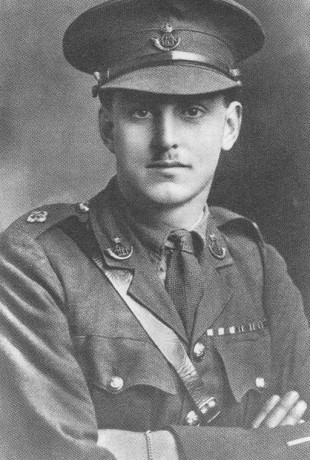
QUIET LAD: James Bradford
“At the end of the play I wanted to show the impact on George of knowing his brothers being wounded and heroic and perhaps the pressure of ‘How do you not volunteer, when they were taught to play to win?’. Sadly, James’ wife ended up in a Harrogate sanatorium for war widows who were struggling to cope with the loss.”
Rodney paid tribute to director Psyche Stott for helping her to bring all the elements together.
“Anybody can find out about the brothers because of the book by Harry Moss, and I attended a talk he gave and that was incredibly useful. What we have to remember is these weren’t lions led by donkeys, they were men who were willing and able and brave. I didn’t want this play to talk about the terrible loss. I want people to know about the comradeship that existed, even though things didn’t end well for them.”
Jamie Brown (Gateshead) plays James; Micky Cochrane (Gateshead) is George; Chris Connel (Newcastle) is Thomas; Jessica Johnson (Sunderland) is Nancy/Amy and Justin McDonald (Gateshead) is Roland.
The play has been two years in the development, and is being funded as part of Durham County Council’s Durham Remembers programme. The project, which celebrates the 100th anniversary of The Somme, is also being supported by the West Auckland ward elected members neighbourhood budget through Bishop Auckland and Shildon Area Action Partnership.
The Fighting Bradfords, Durham Gala Theatre, Thursday, September 8 to Saturday, September 17. Box Office: 03000-266600 or galadurham.co.uk

